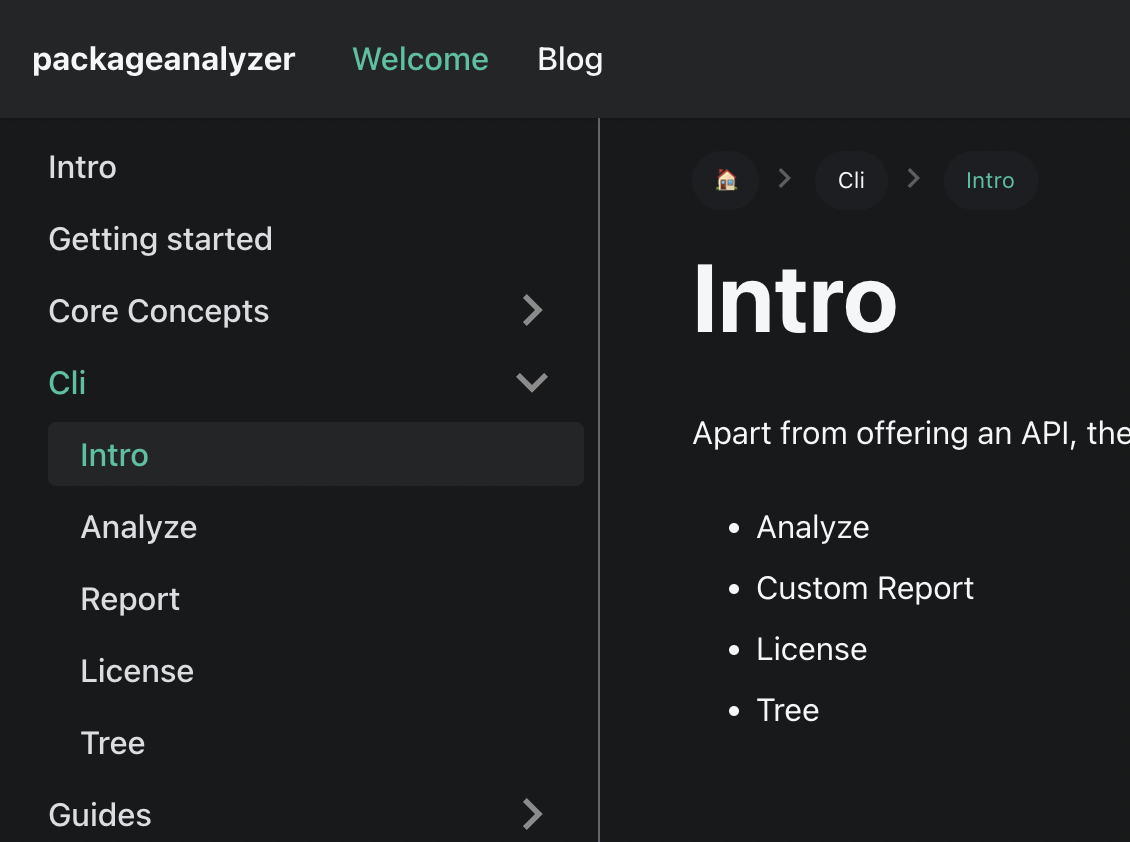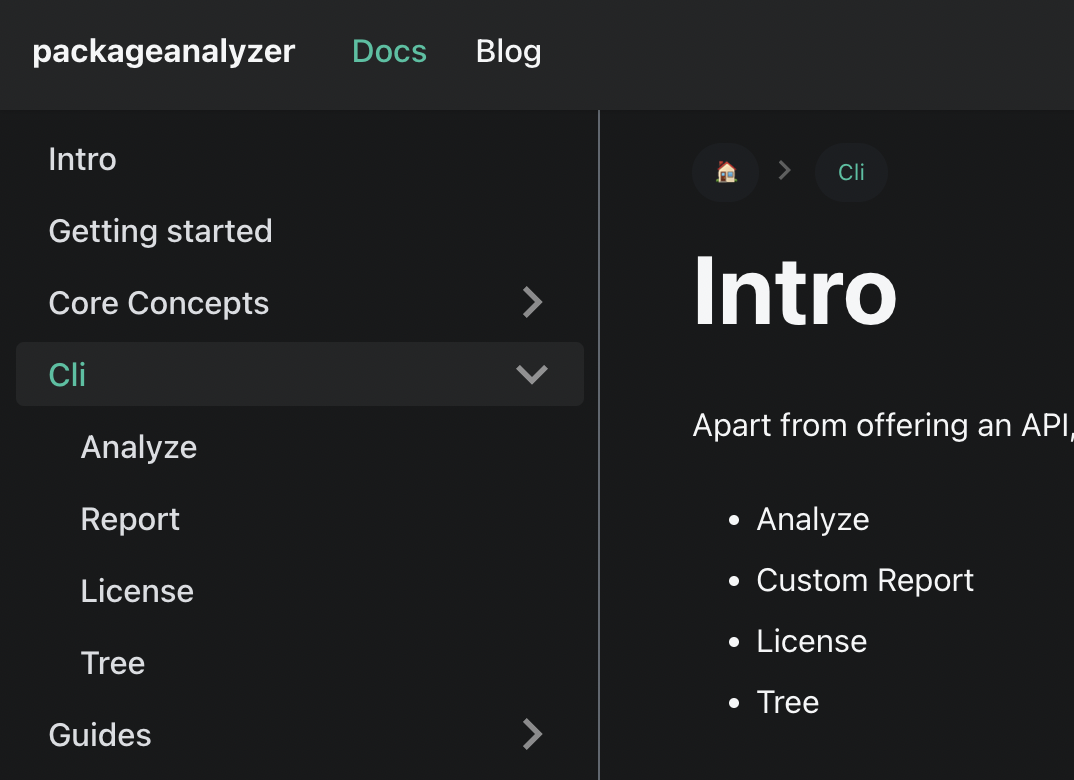Devblog #5 - Docs update
Introduction
The beginning of the year saw limited work being done that's also why this devblog comes later than usual as I waited for things to accumulate. Without further ado, here's what's happened: A validation feature was added to the Reports class, code was removed due to low usage and the documentation received various updates.
Also the documentation received its first external pull request 👏
Validation for Reports
To make Reports more bullet proof, work was done on validating input data. This data is used to initialize a Report.
While working with TypeScript, the compiler does already a good job in making sure only the expected data is passed in. However the project is also meant to be used with JavaScript. In this case it needs client side validation.
To satisfy both runtime and build time validation I was looking for a library that could do both.
That's when I stumbled upon io-ts.
According to the GitHub repo it's a:
Runtime type system for IO decoding/encoding
The nice thing is as you create the runtime validation code it will automatically generate appropriate TypeScript types.
Before
This example shows the input data for the Loops command.
There used to be just an interface describing the input data e.g.
export interface ILoopParams {
package: string;
type: DependencyTypes; // "dependencies" | "devDependencies"
}
then later on in the report method it would be validated like:
if (!isValidDependencyType(this.type)) {
throw new Error(
`Please only specify "dependencies" or "devDependencies" for the --type argument`
);
}
That caused a little bit of friction as interface declaration and runtime check are completely separated. With io-ts it's possible to generate the interface automatically.
Now
const LoopParams = t.intersection([BasePackageParameter, TypeParameter]);
export type ILoopParams = t.TypeOf<typeof LoopParams>;
Now this can look daunting but the gist is that t.intersection allows me to compose an object where I can specify the validation for each key.
Then t.TypeOf allows me to generate the interface automatically, it is the very same ILoopsParams interface as in the Before example.
To make use of the validation a optional method validate was added to the Report class. Optional to allow for quick iteration with Reports.
All you need to do is return the validation object, in this case LoopParams:
override validate(): t.Type<ILoopParams> {
return LoopParams;
}
No more manual validation in the report method necessary, all validation will happen in the validate method. What's more, validation code can be easily shared. In the above example type needs to be "dependency" or "devDependency", this is ensured by BasePackageParameter. If another report needs to do the same check, it can simply reuse it:
//LoopsReport
const LoopParams = t.intersection([BasePackageParameter, TypeParameter]);
//LicenseReport
const PackageParams = t.intersection([BasePackageParameter, OptionalParams]);
const FolderParams = t.intersection([BaseFolderParameter, OptionalParams]);
Also modern JS syntax makes it very easy to check and execute the validate method if present:
const result = this.validate?.().decode(params);
👏
Removing failed code
Even though I tried to live by YAGNI some code slipped in that was essentially useless. It seemed like a good idea at the time but ultimatively it turned out that it is not used or has little value overall. Additionally it made extending the packageanalyzer unnecessarily complicated. Time to remove it.
Cause
Here's the interface for the Provider, the purpose of this class is to return the package.json for a given dependency:
export interface IPackageJsonProvider {
//load version specific data, loads latest version if no version is specified
getPackageJson: (...args: PackageVersion) => Promise<IPackageJson>;
getPackageJsons: (modules: PackageVersion[]) => AsyncIterableIterator<IPackageJson>;
}
getPackageJson allows you to query 1 dependency while getPackageJsons allows you to query an array of dependencies.
While the implementation of getPackageJson always differed depending on the use case (read from the fs, from a server etc.), the implementation of getPackageJsons turned out to be a copy and paste every time:
async *getPackageJsons(modules: PackageVersion[]): AsyncIterableIterator<IPackageJson> {
for (const [name, version] of modules) {
yield this.getPackageJson(name, version);
}
}
This code ended up in every implementation of the IPackageJsonProvider interface, it never differed nor was there ever any need to have a different implementation.
Luckily there was only one usage of getPackageJsons method in the code so far and that was during the traversal of the dependency tree.
So I decided to remove this method from the interface and from every implementation and rewrite the tree traversal to use getPackageJson instead.
So now if you create a new Provider you only need to implement 1 method 🙌.
Docs updates
The documentation also saw some updates:
First pull request
Ph0tonic submitted the first ever PR to the documentation 👏

thanks!
New guide for the Decorator
A new guide was added that shows how to create a Decorator.
Screenshots
The Cli Report documentation now shows an actual screenshot of the command and not "todo screenshot" 😅
Sections are now clickable
Sections are now clickable and will show a short introduction.
Previously you could only expand a section and then there was a dedicated Intro page explaining the section like shown here:
Previous

But now sections are clickable and what previously was shown in the Intro page has been moved to root:
Now

This was done for all expandable sections, not just for Cli.
Next Steps
As a general outlook, here's what is planned going forward this year:
Monorepo?
As the project grows it might be time to try out a different project structure. The idea of the packageanalyzer is that it only provides the utility functions. Any other functionality should be provided by Reports or Decorators. For this reason it might make sense to look into monorepos to separate between the core and extra functionality.
Multireports
Currently the Report class only supports 1 package. In order to compare 2 or more packages the Report class should support multiple packages.
The idea is to extend the packageanalyzer so that diff views of packages can created. E.g. compare 2 versions of the same package and see what changed (dependency changes, maintainer changes etc.).
Override support
Recently NPM added support for overrides. This allows you to replace a package in the dependency tree. It can for example be used to override a dependency with a known security issue or replacing an existing dependency with a fork etc.
Currently the packageanalyzer does not take the overrides config into account when traversing the dependency tree.
Lockfile support
Likewise the packageanalyzer does not currently take lockfiles into account when traversing the dependency tree.